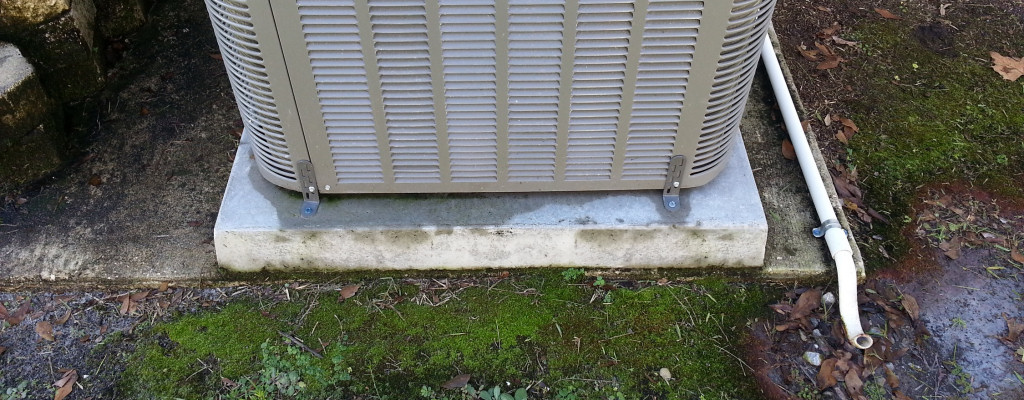Have you noticed water dripping from your air conditioner or a pool forming underneath it? Any air conditioner leak is cause for concern, especially as summer approaches. You can’t afford to neglect the unit in the season you need it to work the best.
Letting a problem go unaddressed can lead to emergency air conditioning repair service and discomfort. This guide covers the main reasons you’ll find your air conditioner leaking water and what you can do to stop it.
Where does the water come from?
Airborne water vapor condenses into a liquid as your AC unit distributes cold air into your home. A modern AC system has outdoor and indoor units that help with proper airflow. The inside part has an evaporator coil that chills your home’s warm air to produce a comfortable temperature in your living space. Condensation forms via this process, and dripping water lands in the drain pan.
This moisture pools in the pan, and the excess water is funneled through the condensation drain line, leading it out of your home. So, you won’t find your air conditioner leaking water as long as the system is functioning properly.
However, there are many ways that this process can encounter trouble. If even just one part isn’t working, you may discover a leak – and that’s something you don’t want to ignore.
9 reasons your AC system leaks water
While you can still use a leaking air conditioner, it isn’t recommended for extended use. Instead, you should turn off the system and investigate the cause of the problem, which will likely be one of the nine common reasons below.
1) A clogged drain line prevents your air conditioning unit from emptying its drain pan. When faced with an obstructed condensation drain line, dirt and debris build up, making it difficult or impossible for water to be appropriately directed outside your home. You can attempt to clear the blockage yourself, but you could potentially damage parts of the HVAC unit if you do it incorrectly. When in doubt, call our friendly professionals to clear your clogged drain lines the right way.
2) An older unit may have a rusted or damaged drain pan that prevents the dripping water from reaching the condensation line. You can replace the drain pan to see if that resolves the issue, but if that’s too daunting of a task, you can call us to correct the problem.
3) You’ll find your AC leaking water with a disconnected or split drain line. The drain pan funnels water into the drain line, but a severed connection will send water leaking all over the place instead of directing it outside your home, where it belongs. You may be able to reconnect or replace the line yourself, but when in doubt, have your AC leak looked at by our expert HVAC technicians for the best results.
4) An air conditioner leak may be due to a condensation pump stoppage. This doesn’t necessarily mean that the pump has failed, but that there is a drainage issue causing the accumulated water to spill over onto the floor. If the pump can’t push the water through the drain line, turn it off and manually empty the drain pan to see what the issue is. If the pump still won’t work, it’s time to replace it – and we’re always happy to help with equipment failures like this.
5) Several system issues can cause a frozen evaporator coil. To fix an iced-up coil and restore airflow to your home, turn off your AC and allow the ice to melt. You’ll notice that your AC is dripping water, but this is just the unit thawing out. Once it’s ice-free, turn your system back on. If the coil freezes again, call our neighborly team to inspect the unit to ensure everything runs smoothly.
6) A dirty filter causes your air conditioner to work much harder than necessary. This extra strain makes it difficult for the warm air you want cooled to reach its destination. Replace your air filter once a month for the best results. A clean air filter will improve your system’s efficiency and prevent any freezing or water from harming the unit. Also, you’ll want to make sure the air vents are clear and not blocked by any debris.
7) Do not operate your air conditioner if the outside temperature is too cold – that is, below 65° F. This will cause the coils to freeze, which will damage the unit. Instead, wait for the weather to warm up before turning the AC on. If you suspect that below-temperature operation has damaged your system, call us! We’ll investigate and provide you with an honest evaluation.
8) If your AC doesn’t have enough refrigerant, the unit will eventually develop a water leak. A hissing or bubbling sound can indicate a low level, or if your home feels warmer than usual, you should check the unit. If you discover a refrigerant leak, turn the system off immediately and have our experts out for a visit right away – do not try to repair the leak yourself.
9) If your system was installed improperly, water leakage may occur. Accumulated water underneath your unit can destroy flooring and ceilings if not addressed quickly. Likewise, as we discussed in last week’s article, if the HVAC unit is too big or too small for your home, it won’t work well, which can also cause a leak. Our Comfort Consultants can advise on the best way forward so that your home is cooled correctly.
Trust Hey Neighbor Heating & Cooling for all your AC repair needs
No matter what is causing the issue, water leaking from your AC unit is never good. Water damage is expensive and can ruin your home.
Thankfully, the air conditioning repair professionals here at Hey Neighbor Heating & Cooling are always happy to help! We’ll come to your home, take a look at your unit, diagnose the cause of the leak, and get your system in tip-top condition again before you know it.


Comments are closed